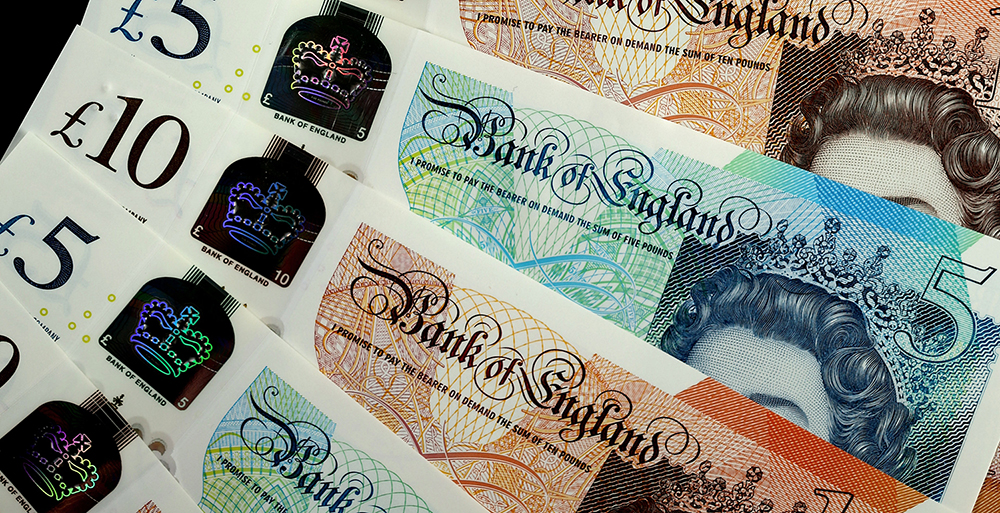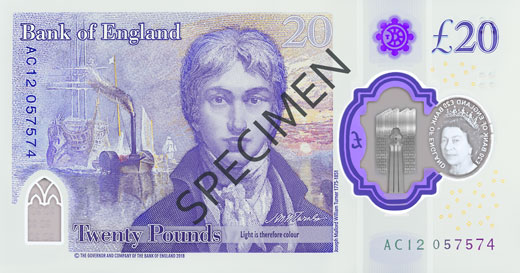Posts Tagged ‘Alan Turing’
Are polymer banknotes indestructible? Millions of damaged notes forced to be replaced…
Do you remember how strange it felt to hold your first polymer £5 note when they were released back in 2016?
Billed as the most durable banknotes yet, the new polymer notes replaced the old paper versions with a thin and flexible plastic material which was said to be cleaner, safer and stronger.
And whilst it’s claimed they should last 2.5 times the lifespan of paper notes, it seems they might not be as durable as once thought…

It’s now been four years since the £5 notes were released, three years since the £10 notes were released and we’re just over a month away from the release of the new polymer £20 note.
Whilst we’re all really excited for the upcoming release of the new £20 note featuring JMW Turner, the question remains as to how durable this note will really be.
50 million damaged polymer banknotes replaced
Recent figures suggest that almost 50 million polymer £5 and £10 notes have been forced to be replaced due to the wear and tear sustained since they were released into circulation.
The Bank of England have said that the damage was mainly caused by “folds, tears, holes and foil wear”.
Figures from the Press Association news agency, say that roughly 20 million polymer £5 notes and around 26 million £10 notes have been swapped so far due to damage.
However, the Bank has never said the new notes are indestructible, instead claiming that they should last 2.5 times longer than paper notes, which were lasting an average of just two years in circulation.
The number of polymer banknotes being replaced only represents a small percentage of the total number which are circulating and the Bank suggests that this is in line with their expectations.

“While we expect the polymer notes to have a longer life, it is too early in the note’s lifecycle to yet understand the rate of replacement of polymer notes,” they said.
“The use of polymer means it can better withstand being repeatedly folded into wallets or scrunched up inside pockets, and can also survive a spin in the washing machine.”
In 2015, 21,835 paper banknotes were replaced due to damage from being torn, washed, contaminated, damaged and even chewed and eaten!
The new polymer material is resistant to dirt and moisture which means they will stay in a better condition for longer.
Plus, when a polymer note reaches the end of its life, it will be recycled, meaning the new notes are more environmentally friendly.
New polymer notes to be released
The new £20 note is due to enter circulation on 20 February 2020 and initially the note will be in circulation alongside the existing paper £20 notes.

These will eventually be phased out as we have seen with the paper £5 and £10 notes in the past years.
We are also expecting the new £50 polymer banknote featuring mathematician and second world war codebreaker Alan Turing in 2021.
Are you looking forward to seeing the new polymer notes, and have you experienced any damage to your £5 and £10 polymer notes? Let us know in the comments below!
If you’re interested in coin collecting, our Change Checker web app is completely free to use and allows users to:
– Find and identify the coins in their pocket
– Collect and track the coins they have
– Swap their spare coins with other Change Checkers

Sign up today at: www.changechecker.org/app
Face of the Fifty Pound Note REVEALED!
This morning The Bank of England revealed Alan Turing as the new face of the £50 banknote, which will be released into circulation in 2021.
In their search to find an eminent British scientist to feature on the £50 note, a total of 227,299 nominations were sent to The Bank of England. 989 eligible characters were narrowed down to a shortlist of just 12 before Turing was finally selected.
Codebreaker Alan Turing will be on Britain’s new 50-pound currency https://t.co/PcmHWkqre3
— TIME (@TIME) July 15, 2019
Other candidates included Rosalind Franklin, Stephen Hawking, Ernest Rutherford and Mary Anning to name a few.
The Bank’s chief cashier, Sarah John said, “The strength of the shortlist is testament to the UK’s incredible scientific contribution. The breadth of individuals and achievements reflects the huge range of nominations we received for this note and I would like to thank the public for all their suggestions of scientists we could celebrate.”

About Alan Turing
Alan Turing is perhaps best known for his outstanding code-breaking which was vital to the Allied victory in WWII.
However, he was also considered a pioneer in computer sciences and the development of the early computer. His work has had an enormous impact on our lives today.
The Bank of England governor, Mark Carney said, “Alan Turing was an outstanding mathematician whose work has had an enormous impact on how we live today. As the father of computer science and artificial intelligence, as well as [a] war hero, Alan Turing’s contributions were far ranging and path breaking. Turing is a giant on whose shoulders so many now stand.”
Sadly, in 1952 he was prosecuted for homosexual acts and died in 1954 from cyanide poisoning. It was determined that his death was an act of suicide.
The new note
Next year the new £20 polymer note will be issued, featuring British Artist, JMW Turner.
This will be the third UK banknote to be made from polymer and will be swiftly followed by the new £50 note in 2021, thus completing the UK’s changeover to plastic banknotes.
These notes are more durable, secure and environmentally friendly than paper notes.

The future of cash
There have been debates in recent years as to whether or not Britain should become a cashless society.
The rise of card and electronic payments means that many see cash as becoming obsolete, with the 1p and 2p coins at the heart of the debate.
In addition to this, the validity of the £50 note has also been questioned, as it is rarely used in everyday payments and is widely thought of as being used by criminals.
The good news for Change Checkers is that the Treasury have confirmed that cash will be around for years to come.
And, with the introduction of the new Alan Turing £50 note in 2021, I think it’s fair to say that cash is still king.
If you’re interested in coin collecting, our Change Checker web app is completely free to use and allows users to:
– Find and identify the coins in their pocket
– Collect and track the coins they have
– Swap their spare coins with other Change Checkers
Sign up today at: www.changechecker.org/app




